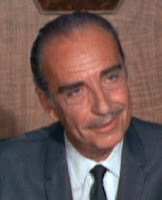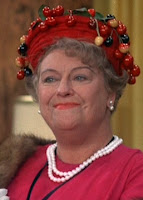With his death on Christmas Eve, obituaries are calling
Charles Durning "prolific" and the "king of the character actors", and of course, I wouldn't dispute that. But what I marvel in is that I don't believe Durning ever gave a weak performance. He was simply one of those journeymen actors that was good in everything he did. He did both comedy and drama with what appeared to be relative ease. He most enjoyed the stage, but did scores of films and television shows over the last forty years. He was able to dance despite a size that would keep other men sedentary. And he had a personality that was hard to dislike, no matter what the role. You combine these facts with heroic military service (three Purple Hearts and the Silver Star from WWII as he was in the first wave on Omaha Beach on D-Day), and a tough childhood (he lost his father and five sisters at a young age) and it's hard to deny
Charles Durning was not only one hell of an actor, but he was one hell of a man as well. His first big break came in 1962 when he began a long association with Joseph Papp, who eventually cast him in some 35 plays (he did do a few films between 1962 and 1972). His performance in the play
That Championship Season led to his being cast as a corrupt policeman in the the film classic
The Sting in 1973 and in the forty years since, Durning has never looked back. Lumet's fantastic 1975 film
Dog Day Afternoon showcased Durning as the police hostage negotiator dealing with Al Pacino in one of his greatest roles. But there were more, he romanced Dustin Hoffman in
Tootsie; was himself a hostage as the President of the United States in
Twilight's Last Gleaming (a particular favorite of mine); he captained
The Hindenburg; chased outlaws in the western
Breakheart Pass; he was a football coach in
North Dallas Forty; and a corrupt power broker in
True Confessions (he dances an Irish jig in this one). Speaking of dancing, he made quite a showing in the tv movie
Queen of the Stardust Ballroom co-starring Maureen Stapleton and both were nominated for Emmy Awards. He was one of the highlights of the film adaption of the musical
Best Little Whorehouse in Texas, his dance number in this film garnered Durning his first of two Oscar nominations for Best Supporting Actor. He was also nominated the next year for playing a Nazi Colonel in Mel Brooks' remake of
To Be Or Not To Be. But the list goes on and on, and that's what I mean about his career, a smile comes to my face as I think about each of these roles. And there were others... the villain in the original
Muppet Movie; the unlikable newspaperman in Wilder's remake of
The Front Page; The Fury; The Choirboys; Starting Over; Home for the Holidays; Mass Appeal; Beatty's
Dick Tracy; and
O Brother, Where Art Thou?. He played Santa Claus at least four times and roles as diverse as the Pope and JFK's father. He was good to television as well, he co-starred on Burt Reynolds' series
Evening Shade as the town doctor and received two of his total nine Emmy Award nominations. He was also nominated for the short-lived sitcom
The Cop & The Kid; for the min-series
Captains & The Kings; Death of a Salesman; Attica; as well as for his role as Denis Leary's ex-firefighter father in
Rescue Me and guest apperances in
Homicide and
NCIS.
The stage was Durning's first love and he was awarded a Tony for his performance as Big Daddy in the revival of
Cat on a Hot Tin Roof on Broadway in 1990. He also appeared in such notable plays as
The Gin Game; Gore Vidal's The Best Man; Inherit the Wind; Third and others. In 2008
Charles Durning was given the Screen Actors Guild Life Achievement Award, which was presented by his old friend Burt Reynolds. It was an emotional presentation. It appears that Durning continued to work almost until the last, with a couple of films still to be released at this writing. Separated from his second wife, he is survived by three children and will be buried at Arlington National Cemetery, a fitting tribute to a "hero", both as an actor and a man who served his country.








































